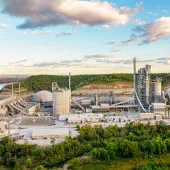GCCA releases decarbonization progress report at COP28
Cement Industry Net Zero Progress Report 2023 provides update on global action and progress
THE extensive work being carried out by the world’s cement and concrete industry and the Global Cement and Concrete Association (GCCA), to cut CO2 emissions, is set out in a newly published report, launched at COP28 in Dubai.
In 2021, the world’s leading producers, representing 80% of global production outside China, became the first ‘heavy’ industry to set out a clear pathway to decarbonization, by signing up to the GCCA’s ‘Cement and Concrete Industry’s 2050 Net Zero Roadmap’ and committing to help limit global warming to 1.5°C, in line with UN agreements.
Now, two years on, the action taken so far is set out in the GCCA’s ‘Cement Industry Net Zero Progress Report 2023’.
According to the GCCA, the combined decarbonization efforts of the Association and its members is making a difference. Independently verified published data shows there has been a 23% drop in CO2 emission intensity of cement-related material, compared with 1990 levels.
‘We are pleased to present this report, which captures the progress our industry is making towards net zero, but it will take the combined efforts of industry, governments, and societies around the world to deliver on this commitment,’ said Fernando Gonzalez, chief executive officer of Cemex and President of the GCCA.
‘This is the decade to deliver, and my number one priority is to facilitate the GCCA roadmap levers, designed to make full decarbonization of our industry possible.’
The development of carbon capture, utilization, and storage (CCUS); the increasing use of alternative energy; and the adoption of new materials and technology, are just some of the levers being used to cut emissions. Among the decarbonization projects featured in the new report, are:
Development of carbon capture, utilization, and storage: CCUS is expected to account for 36% of the industry’s global CO2 reductions, according to the GCCA Roadmap. Projects to develop CCUS plants featured in the report include Breedon in the UK, Heidelberg Materials in Germany, Holcim in Switzerland, Taiheiyo Cement in Japan, and TITAN Cement Group in Greece.
Increasing use of alternative energy sources: Examples include more use of solar power in the US, India, and Taiwan, the use of hydrogen at a cement plant in Honduras, and a plant in India making use of sustainable, cultivated bamboo.
Development of technology and alternative materials to make low-carbon cement: These projects use less clinker – the carbon-intensive element of traditional cement production – and make more use of alternative materials, such as calcined clay. Examples include a project involving VDZ in Germany, which has seen the construction of a high-rise tower using low-carbon cement; and in Thailand, where SCG are involved in planning an entire low-carbon model city.
Projects making use of non-recyclable and industrial waste as fuel for cement plants: These initiatives help reduce societal waste and support a circular economy. Examples come from Guatemala, Japan, India, and across Europe, including CRH’s new co-processing facility for non-recyclable waste in Romania.
Rehabilitation of local environments: In New Zealand, Winstone Aggregates, part of the Fletcher Group, are leading a project which has already seen 110ha of quarry rehabilitated into the natural environment, helping to reduce local emissions by 19%. A quarry rehabilitation project in China is also featured.

Thomas Guillot, chief executive of the GCCA, said: ‘This report highlights the key progress we have already made, but there is still a long way to go. We are committed to cutting CO2 emissions by a further 25% by 2030 and achieving full decarbonization by 2050.
‘With its resilience to damage from heat, wind, and flooding, concrete will be key to delivering the adequate housing and infrastructure the world will need in the future, to meet the UN Sustainable Development Goals. That’s why it’s important that we are in Dubai at COP28, calling on all policymakers, governments, and anyone with a stake in the built environment to work with us on our net-zero mission.’










